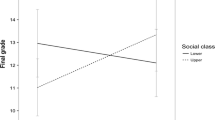Abstract
This study extended Dweck's model of achievement motivation to the collegiate level, and it is the first to apply this model to nontraditional students. We examined the relationship between goal orientations and academic performance in 262 undergraduate students grouped by nontraditional vs. traditional status. Although both groups rated themselves higher on learning goals than on performance goals, non-traditional students endorsed learning goals even more strongly than their traditional peers. Goal orientations were a better predictor of academic success than student status. Consistent with Dweck's model, a learning goal orientation was positively related to successful academic performance for both groups. The relationship between performance goals and academic success was less straightforward, but students who rated both goal orientations as relatively weak had the lowest cumulative GPAs. Traditional and nontraditional students differed on variables that were inversely related to academic performance. Less successful traditional students endorsed irrational beliefs (a possible index of learned helplessness), while less successful nontraditional students worked more hours at a paid job.
Similar content being viewed by others
REFERENCES
Abramson, L. Y., Seligman, M. E. P., and Teasdale, J. D. (1978). Learned helplessness in humans: Critique and reformulation. Journal of Abnormal and Social Psychology 67: 49-74.
Cain, K. M., and Dweck, C. S. (1995). The relation between motivational patterns and achievement cognitions through the elementary school years. Merrill-Palmer Quarterly 41: 25-52.
Dweck, C. S. (1975). The role of expectations and attributions in the alleviation of learned helplessness. Journal of Personality and Social Psychology 31: 674-685.
Dweck, C. S. (1986). Motivational processes affecting learning. American Psychologist 41: 1040-1048.
Dweck, C. S., and Leggett, E. L. (1988). A social-cognitive approach to motivation and personality. Psychological Review 95: 256-273.
Dweck, C. S., and Reppucci, N. D. (1973). Learned helplessness and reinforcement responsibility in children. Journal of Personality and Social Psychology 25: 109-116.
Eison, J. A. (1981). A new instrument for assessing students' orientation towards grades and learning. Psychological Reports 48: 919-924.
Ellis, A. (1962). Reason and Emotion in Psychotherapy. New York: Lyle Stuart.
Fincham, F. D., Hokoda, A., and Sanders, R. (1989). Learned helplessness, test anxiety, and academic achievement: A longitudinal analysis. Child Development 60: 138-145.
Hayamizu, T., and Weiner, B. (1991). A test of Dweck's model of achievement goals as related to perceptions of ability. Journal of Experimental Education 59: 226-234.
Licht, B. G., and Dweck, C. S. (1984). Determinants of academic achievement: The interaction of children's achievement orientations with skill area. Developmental Psychology 20: 628-636.
MacDonald, A. P., and Games, R. G. (1972). Ellis irrational values. Rational Living 7: 25-28.
Miller, R. B., Behrens, J. T., Greene, B. A., and Newman, D. (1993). Goals and perceived ability: Impact on student valuing, self-regulation, and persistence. Contemporary Educational Psychology 18: 2-14.
Roedel, T. D., and Schraw, G. (1995). Beliefs about intelligence and academic goals. Contemporary Educational Psychology 20: 464-468.
Roedel, T. D., Schraw, G., and Plake, B. S. (1994). Validation of a measure of learning and performance goal orientations. Educational and Psychological Measurement 54: 1013-1021.
Schraw, G., Horn, C., Thorndike-Christ, T., and Bruning, R. (1995). Academic goal orientations and student classroom achievement. Contemporary Educational Psychology 20: 359-368.
Seligman, M. E. P. (1975). Helplessness: On Depression, Development, and Death. San Francisco, CA: W. H. Freeman.
Shields, N. (1993). Attribution processes and stages of adult life development among adult university students. Journal of Applied Social Psychology 23: 1321-1336.
Smiley, P. A., and Dweck, C. S. (1994). Individual differences in achievement goals among young children. Child Development 65: 1723-1743.
Stipek, D., and MacIver, D. (1989). Developmental change in children's assessment of intellectual competence. Child Development 60: 521-538.
Werring, C. J. (1987). Responding to the older aged full-time student: Preferences for undergraduate education. College Student Affairs Journal 1: 13-20.
Wolfgang, M. E., and Dowling, W. D. (1981). Differences in motivation of adult and younger undergraduates. Journal of Higher Education 52: 640-648.
Author information
Authors and Affiliations
Rights and permissions
About this article
Cite this article
Eppler, M.A., Harju, B.L. Achievement Motivation Goals in Relation to Academic Performance in Traditional and Nontraditional College Students. Research in Higher Education 38, 557–573 (1997). https://doi.org/10.1023/A:1024944429347
Issue Date:
DOI: https://doi.org/10.1023/A:1024944429347




